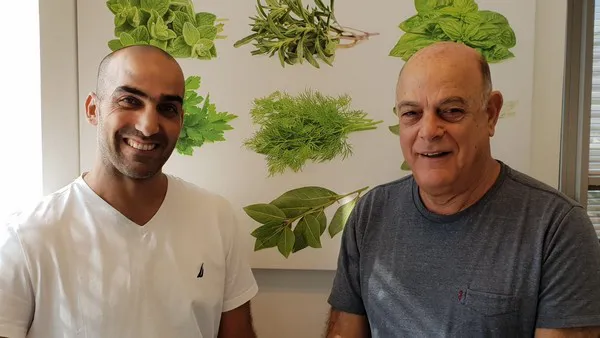Amos Betzer has extensive knowledge of the Israeli agricultural export sector. In 1999, he joined one of the very first private Israeli exporters of cut flowers and foliage. He created this company’s fruit and vegetables division. Ten years later, he left this company and founded his own business, Viva Agriculture.

Yair Ohana, sales manager, and Amos Betzer, owner of Viva Agricultura.
“We are now doing, mainly, fresh herbs,” says Amos. Yair Ohana joined Amos 13 years ago. He is now at Viva’s Sales. He says they are currently focusing strongly on mini vegetables. “They come from South Africa. We believe there is a huge market for this product. Most of our clients who deal with fresh herbs, also sell this special product. So, it fits in well with our range.”
More product from East Africa
“However, 15 years ago, we started growing herbs in Kenya.” He explains that, slowly but surely, herb production moved from Israel to Africa. “Nowadays, about 70% of our business in fresh herbs is from Kenya, Ethiopia, Uganda, and Tanzania. Our main product remains herbs, but we have also started with beans and peas from Kenya.”
These include varieties such as sugar snaps, snow peas, broccolini, and haricot verts. “For the moment, these are mainly for the European market” says Yair. “It is developing nicely.”
Want to penetrate North American markets
“The goal is to develop the US and Canadian markets. “I think Israel has overlooked these markets because it was easier to work with the European markets,” says Yair. “I am focusing on our main product, fresh herbs. I believe there is a huge market in the US and Canadian markets. So, this is my main focus at the moment.”
Yair says Viva Agriculture is also starting to do peppers for the US market. “We also sell Israeli Organic Bell Peppers and Chili Habaneros. These are excellent products.”
Importing blueberries
“Since the shekel is so strong, we have decided to start importing to Israel,” adds Amos. “In the last seven years, we have been importing blueberries from Argentina and Chile. We have been developing the market for blueberries in Israel.” This season runs from early September to April. “There is room to develop this product further.”
Amos wants to introduce people in Israel to the various kinds of berries. “Everyone knows strawberries, but the market for the other berry varieties like raspberries and blueberries is very small.” He says it is going well.
Climate change is real
Yair says the changing weather is an important factor for their business. “Everyone is talking about climate change. Our main season was winter. This has changed in the past few years. We find that the European herb growth season lasts longer and longer. When I started selling fresh herbs 13 years ago, winter started at the beginning of September and lasted until the end of May.”
“Today, winter starts in November, and it ends at the end of March/beginning of April. Then you already start seeing local production in Europe. I thought winter would move to a different time of the year. However, it is simply becoming shorter. But in the summer, suddenly, we're busier now.” This increased activity has to do with the work they do in Kenya.
Amos says although production methods are changing, consumption is also on the rise. “Modern cooking uses more herbs, and new countries are also joining the party.”
High currency exchange rate is a major issue
Israeli herbs are still very important for the company. “They amount to about 30% of our turnover. It used to be 100%. Its share is, unfortunately, declining. The main issue for Israeli growers is the high currency exchange rate,” says Amos.
“Yes, in Kenya, labor is much cheaper, but, they have issues with logistics. Israel logistics is much better and easier and, relatively, much less expensive than in Africa.” For example, in Ethiopia, the company needs to book air space days in advance. “Here, in Israel, we can ship products the same day. Good logistics is crucial for herbs.”
According to Amos Betzer, the Israeli government must realize that the current high currency rate is negatively affecting all exports from Israel, not just for the agricultural sector. “What country would we like to have?” he asks. “Do we want to keep some kind of production in Israel? This has always been the intention.”
For more information: 
Yair Ohana
Viva Agricultura
Tel: +972-3-6863908
Email: ohana@vivafarmers.com
www.vivafarmers.com
